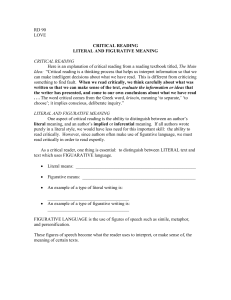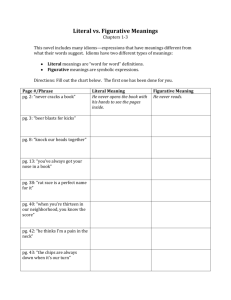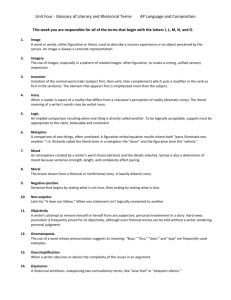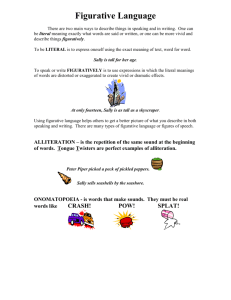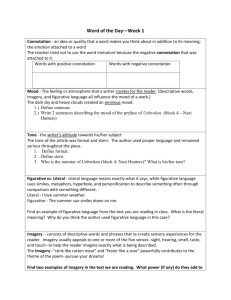File
advertisement
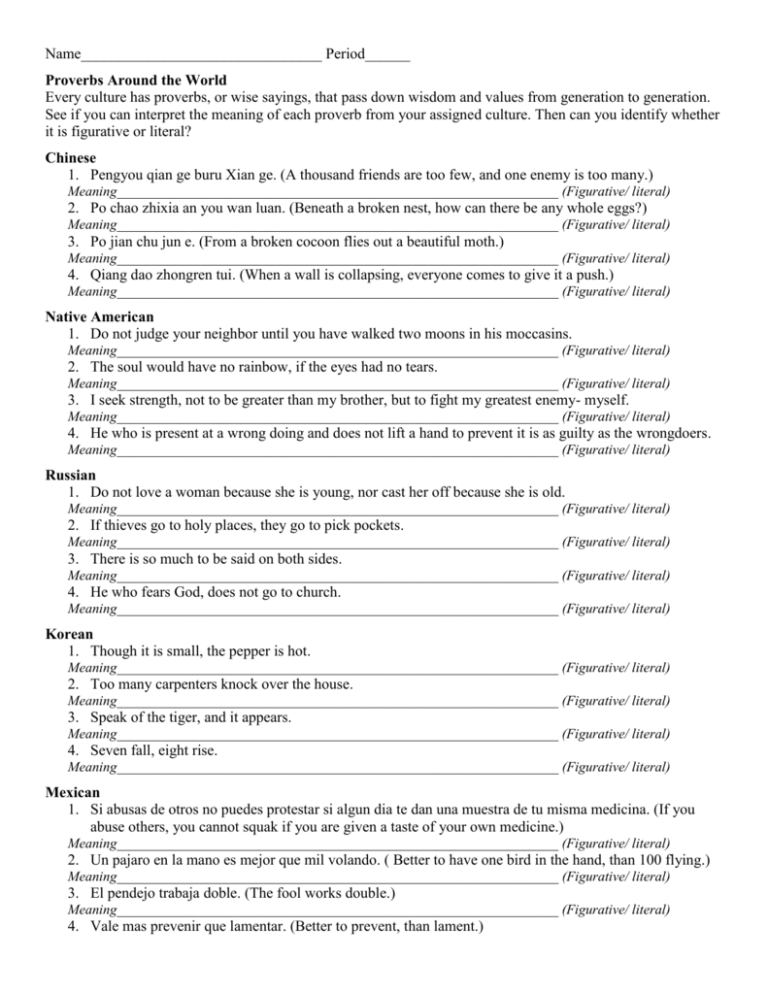
Name________________________________ Period______ Proverbs Around the World Every culture has proverbs, or wise sayings, that pass down wisdom and values from generation to generation. See if you can interpret the meaning of each proverb from your assigned culture. Then can you identify whether it is figurative or literal? Chinese 1. Pengyou qian ge buru Xian ge. (A thousand friends are too few, and one enemy is too many.) Meaning________________________________________________________________ (Figurative/ literal) 2. Po chao zhixia an you wan luan. (Beneath a broken nest, how can there be any whole eggs?) Meaning________________________________________________________________ (Figurative/ literal) 3. Po jian chu jun e. (From a broken cocoon flies out a beautiful moth.) Meaning________________________________________________________________ (Figurative/ literal) 4. Qiang dao zhongren tui. (When a wall is collapsing, everyone comes to give it a push.) Meaning________________________________________________________________ (Figurative/ literal) Native American 1. Do not judge your neighbor until you have walked two moons in his moccasins. Meaning________________________________________________________________ (Figurative/ literal) 2. The soul would have no rainbow, if the eyes had no tears. Meaning________________________________________________________________ (Figurative/ literal) 3. I seek strength, not to be greater than my brother, but to fight my greatest enemy- myself. Meaning________________________________________________________________ (Figurative/ literal) 4. He who is present at a wrong doing and does not lift a hand to prevent it is as guilty as the wrongdoers. Meaning________________________________________________________________ (Figurative/ literal) Russian 1. Do not love a woman because she is young, nor cast her off because she is old. Meaning________________________________________________________________ (Figurative/ literal) 2. If thieves go to holy places, they go to pick pockets. Meaning________________________________________________________________ (Figurative/ literal) 3. There is so much to be said on both sides. Meaning________________________________________________________________ (Figurative/ literal) 4. He who fears God, does not go to church. Meaning________________________________________________________________ (Figurative/ literal) Korean 1. Though it is small, the pepper is hot. Meaning________________________________________________________________ (Figurative/ literal) 2. Too many carpenters knock over the house. Meaning________________________________________________________________ (Figurative/ literal) 3. Speak of the tiger, and it appears. Meaning________________________________________________________________ (Figurative/ literal) 4. Seven fall, eight rise. Meaning________________________________________________________________ (Figurative/ literal) Mexican 1. Si abusas de otros no puedes protestar si algun dia te dan una muestra de tu misma medicina. (If you abuse others, you cannot squak if you are given a taste of your own medicine.) Meaning________________________________________________________________ (Figurative/ literal) 2. Un pajaro en la mano es mejor que mil volando. ( Better to have one bird in the hand, than 100 flying.) Meaning________________________________________________________________ (Figurative/ literal) 3. El pendejo trabaja doble. (The fool works double.) Meaning________________________________________________________________ (Figurative/ literal) 4. Vale mas prevenir que lamentar. (Better to prevent, than lament.) Meaning________________________________________________________________ (Figurative/ literal) American/English 1. The apple doesn't fall far from the tree. Meaning________________________________________________________________ (Figurative/ literal) 2. The bigger they are, the harder they fall. Meaning________________________________________________________________ (Figurative/ literal) 3. Why buy the cow, when the milk is free? Meaning________________________________________________________________ (Figurative/ literal) 4. If you can't stand the heat, stay out of the kitchen. Meaning________________________________________________________________ (Figurative/ literal) Homework: Record a proverb that has been said in your family/culture. Proverb_____________________________________________________ Meaning____________________________________________________ (Figurative/ literal) RL.6 1 Uh-oh! This many blanks won’t cut it. Make sure you stick with us in class and complete your assignments before turning them in – even your homework! Analyze a particular point of view or cultural experience reflected in a work of literature from outside the United States, drawing on a wide reading of world literature. 2 Eek! You answered, some but you left some blank or you got less than 17 correct. Use your resources to make sure you understand next time. Also, make sure to do the homework! 3 You interpreted all of the proverbs, and got most of them right (17-21), and also brought a proverb in from home. 4 You interpreted all of the proverbs and got almost all correct (22+), and also brought a proverb in from home. Glazer, Mark. A Dictionary of Mexican American Proverbs. New York: Greenwood, 1987. Print. Holt, Daniel D. Tigers, Frogs, and RiceCakes: A book of Korean Proverbs. Auburn CA: Shen's Hood, Edwin Paxton. The World of Proverb and Parable. With Illustrations from History, Biography, and the Anecdotal Table-talk of All Ages. With an Introductory Essay on the Historic Unity of the Popular Proverb and Tale in All Ages. London: Hodder and Stoughton, 1885. Print. Rohsenow, John S. ABC Dictionary of Chinese Proverbs (yanyu). Richmond: Curzon, 2001. Print. Zona, Guy A. The Soul Would Have No Rainbow If the Eyes Had No Tears: and Other Native American Proverbs. New York: Simon & Schuster, 1994. Print.




